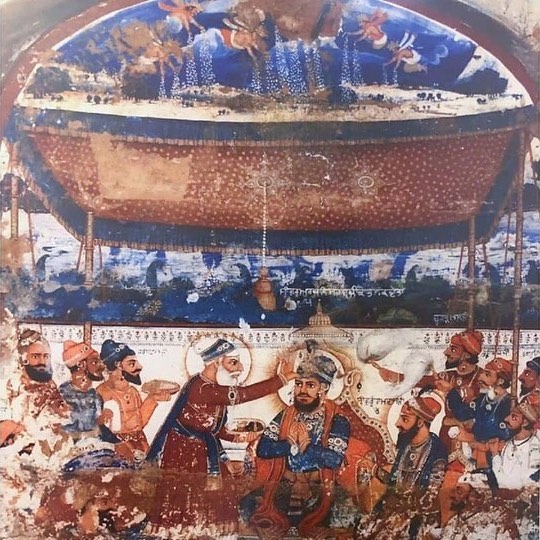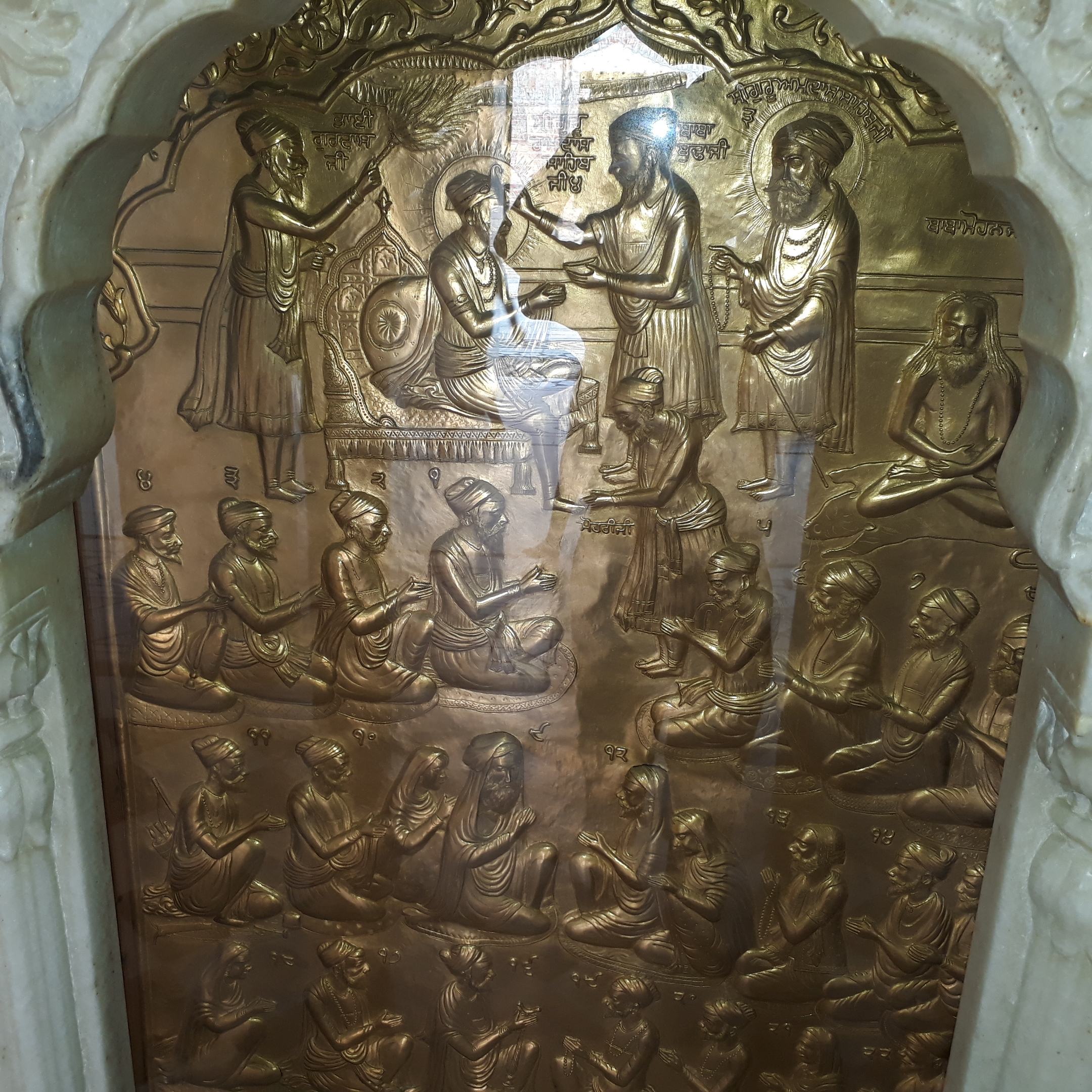|
Sohila
Kirtan Sohila (Gurmukhi: ਕੀਰਤਨ ਸੋਹਿਲਾ ''kīratana sōhilā'') is a night prayer in Sikhism. Its name means 'Song of Praise'. It is composed of five hymns or shabad, the first three by Guru Nanak Dev, the fourth by Guru Ram Das and the fifth by Guru Arjan Dev. This hymn is usually recited at the conclusion of evening ceremonies at the Gurdwara and also recited as part of Sikh funeral services, as a means to remind those in-attendance to accept that death is the ultimate truth. This hymn is also recited before sleeping during bedtime. The collection of hymns called Sohila is repeated at bedtime by Sikhs. It consists of three hymns of Guru Nanak, one of Guru Ram Das, and one of Guru Arjan Guru Arjan (Gurmukhi: ਗੁਰੂ ਅਰਜਨ, pronunciation: ; 15 April 1563 – 30 May 1606) was the fifth of the ten total Sikh Gurus. He compiled the first official edition of the Sikh scripture called the Adi Granth, which later expande .... The word Sohila is der ... [...More Info...] [...Related Items...] OR: [Wikipedia] [Google] [Baidu] |
Sikhs
Sikhs (singular Sikh: or ; , ) are an ethnoreligious group who adhere to Sikhism, a religion that originated in the late 15th century in the Punjab region of the Indian subcontinent, based on the revelation of Guru Nanak. The term ''Sikh'' has its origin in the Sanskrit word ', meaning 'seeker', or . According to Article I of Chapter 1 of the Sikh Rehat Maryada, Sikh ''Rehat Maryada'' (), the definition of Sikh is: Any human being who faithfully believes in One Immortal Being Ten Gurus, from Guru Nanak Sahib to Guru Gobind Singh Sahib The Guru Granth Sahib The utterances and teachings of the ten Gurus and The initiation, known as the Amrit Sanskar, Amrit Sanchar, bequeathed by the tenth Guru and who does not owe allegiance to any other religion, is a Sikh. Male Sikhs generally have ''Singh'' () as their last name, though not all Singhs are necessarily Sikhs; likewise, female Sikhs have ''Kaur'' () as their last name. These unique last names were given by the Gurus to ... [...More Info...] [...Related Items...] OR: [Wikipedia] [Google] [Baidu] |
Guru Nanak
Gurū Nānak (15 April 1469 – 22 September 1539; Gurmukhi: ਗੁਰੂ ਨਾਨਕ; pronunciation: , ), also known as ('Father Nanak'), was an Indian spiritual teacher, mystic and poet, who is regarded as the founder of Sikhism and is the first of the ten Sikh Gurus. Nanak is said to have travelled far and wide across Asia teaching people the message of '' Ik Onkar'' (), who dwells in every one of his creations and constitutes the eternal Truth. With this concept, he would set up a unique spiritual, social, and political platform based on equality, fraternal love, goodness, and virtue. Nanak's words are registered in the form of 974 poetic hymns, or '' shabda'', in the holy religious scripture of Sikhism, the Guru Granth Sahib, with some of the major prayers being the '' Japji Sahib'' (; ''ji'' and ''sahib'' are suffixes signifying respect); the '' Asa di Var'' ('Ballad of Hope'); and the '' Sidh Gosht'' ('Discussion with the Siddhas'). It is part of Sikh religious b ... [...More Info...] [...Related Items...] OR: [Wikipedia] [Google] [Baidu] |
Guru Arjan
Guru Arjan (Gurmukhi: ਗੁਰੂ ਅਰਜਨ, pronunciation: ; 15 April 1563 – 30 May 1606) was the fifth of the ten total Sikh Gurus. He compiled the first official edition of the Sikh scripture called the Adi Granth, which later expanded into the Guru Granth Sahib. He is regarded as the first of the two Gurus martyred in the Sikh faith. Guru Arjan was born in Goindval, in the Punjab, the youngest son of Bhai Jetha, who later became Guru Ram Das, and Mata Bhani, the daughter of Guru Amar Das. He completed the construction of the Darbar Sahib at Amritsar, after the fourth Sikh Guru founded the town and built a sarovar. Arjan compiled the hymns of previous Gurus and of other saints into Adi Granth, the first edition of the Sikh scripture, and installed it in the Harimandir Sahib. Guru Arjan reorganized the masand system initiated by Guru Ram Das, by suggesting that the Sikhs donate, if possible, one-tenth of their income, goods or service to the Sikh organization ... [...More Info...] [...Related Items...] OR: [Wikipedia] [Google] [Baidu] |
Adi Granth
The Guru Granth Sahib (, ) is the central holy religious scripture of Sikhism, regarded by Sikhs as the final, sovereign and eternal Guru following the lineage of the ten human gurus of the religion. The Adi Granth (), its first rendition, was compiled by the fifth guru, Guru Arjan (1564–1606). Its compilation was completed on 29 August 1604 and first installed inside the Golden Temple in Amritsar on 1 September 1604. Baba Buddha was appointed the first Granthi of the Golden Temple. Shortly afterwards Guru Hargobind added Ramkali Ki Vaar. Later, Guru Gobind Singh, the tenth Sikh guru, added hymns of Guru Tegh Bahadur to the Adi Granth and affirmed the text as his successor. This second rendition became known as the Guru Granth Sahib and is also sometimes referred to as the Adi Granth.Adi Granth Encyclopaedia Bri ... [...More Info...] [...Related Items...] OR: [Wikipedia] [Google] [Baidu] |
Sikhism
Sikhism is an Indian religion and Indian philosophy, philosophy that originated in the Punjab region of the Indian subcontinent around the end of the 15th century CE. It is one of the most recently founded major religious groups, major religions and among the largest in the world with about 25–30million adherents, known as Sikhs. Sikhism developed from the spiritual teachings of Guru Nanak (1469–1539), the faith's first guru, and the nine Sikh gurus who succeeded him. The tenth guru, Guru Gobind Singh (1666–1708), named the Guru Granth Sahib, which is the central religious scripture in Sikhism, was their successor. This brought the line of human gurus to a close. Sikhs regard the Guru Granth Sahib as the 11th and eternally living guru. The core beliefs and practices of Sikhism, articulated in the Guru Granth Sahib and other Sikh scriptures, include faith and meditation in the name of the one creator (''Ik Onkar''), the divine unity and equality of all humankind, engaging ... [...More Info...] [...Related Items...] OR: [Wikipedia] [Google] [Baidu] |
Shabad (hymn)
''Shabda'' (, ) is the Sanskrit word for "speech sound". In Sanskrit grammar, the term refers to an utterance in the sense of linguistic performance. History In classical Indian philosophy of language, the grammarian Katyayana stated that ''shabda'' ("speech") is eternal (''nitya''), as is ''artha'' "meaning", and that they share a mutual co-relation. According to Patanjali, the permanent aspect of ''shabda'' is sphoṭa, ("meaning"), while ''dhvani'' ("sound, acoustics") is ephemeral to ''shabda''. Om, or Om, Aum, a sacred syllable of Hinduism, Buddhism, Jainism and Sikhism, is considered to be the first resonating vibrational sound within an individual being. It also denotes the non-dualistic universe as a whole. In Buddhism, Om corresponds to the crown chakra and white light. Bhartrihari, on the other hand, held a ''shabda-advaita'' position, identifying ''shabda'' as indivisible, and unifying the notions of cognition and linguistic performance, which is ultimately identica ... [...More Info...] [...Related Items...] OR: [Wikipedia] [Google] [Baidu] |
Guru Ram Das
Guru Ram Das (Gurmukhi: ਗੁਰੂ ਰਾਮ ਦਾਸ, pronunciation: ; 24 September 1534 – 1 September 1581), sometimes spelled as Guru Ramdas, was the fourth of the ten Sikh gurus. He was born to a family based in Lahore, who named him Bhai Jetha. He was orphaned at age seven; and thereafter grew up with his maternal grandmother in a village. At age 12, Bhai Jetha and his grandmother moved to Goindwal, Goindval, where they met Guru Amar Das, the third leader of Sikhism. The boy accepted the guru as his mentor, served him, and eventually joined his family by marrying his daughter. When it came time for Guru Amar Das to name his successor, he passed over his own sons and chose Bhai Jetha, citing his exemplary service, selfless devotion, and unquestioning obedience. Renamed Ram Das ("slave of God"), Bhai Jetha became the fourth Guru of Sikhism in 1574. He faced hostility from the sons of Guru Amar Das, and shifted his official base to lands identified by Guru Ama ... [...More Info...] [...Related Items...] OR: [Wikipedia] [Google] [Baidu] |
Hymns
A hymn is a type of song, and partially synonymous with devotional song, specifically written for the purpose of adoration or prayer, and typically addressed to a deity or deities, or to a prominent figure or personification. The word ''hymn'' derives from Greek (''hymnos''), which means "a song of praise". A writer of hymns is known as a hymnist. The singing or composition of hymns is called hymnody. Collections of hymns are known as hymnals or hymn books. Hymns may or may not include instrumental accompaniment. Polyhymnia is the Greco/Roman goddess of hymns. Although most familiar to speakers of English in the context of Christianity, hymns are also a fixture of other world religions, especially on the Indian subcontinent ('' stotras''). Hymns also survive from antiquity, especially from Egyptian and Greek cultures. Some of the oldest surviving examples of notated music are hymns with Greek texts. Origins Ancient Eastern hymns include the Egyptian '' Great Hymn to the A ... [...More Info...] [...Related Items...] OR: [Wikipedia] [Google] [Baidu] |
Punjabi Language
Punjabi, sometimes spelled Panjabi, is an Indo-Aryan languages, Indo-Aryan language native to the Punjab region of Pakistan and India. It is one of the most widely spoken native languages in the world, with approximately 150 million native speakers. Punjabi is the most widely-spoken first language in Pakistan, with 88.9 million native speakers according to the 2023 Pakistani census, and the 11th most widely-spoken in India, with 31.1 million native speakers, according to the 2011 Census of India, 2011 census. It is spoken among a Punjabi diaspora, significant overseas diaspora, particularly in Canada, the United Kingdom, the United States, Australia, and the Arab states of the Persian Gulf, Gulf states. In Pakistan, Punjabi is written using the Shahmukhi alphabet, based on the Persian alphabet, Perso-Arabic script; in India, it is written using the Gurmukhi, Gurmukhi alphabet, based on the Brahmic scripts, Indic scripts. Punjabi is unusual among the Indo-Aryan languages and t ... [...More Info...] [...Related Items...] OR: [Wikipedia] [Google] [Baidu] |
Potwari Language
Pahari Pothwari is an Indo-Aryan language variety of the Lahnda group, spoken in the northern half of Pothohar Plateau, in Punjab, Pakistan, as well as in the most of Pakistan-administered Azad Kashmir and in the western areas of Indian-administered Jammu and Kashmir. It is known by a variety of names, the most common of which are Pahari (; an ambiguous name also applied to other unrelated languages of India), and Pothwari (or Pothohari). The language is transitional between Hindko and standard Punjabi and is mutually intelligible with both. There have been efforts at cultivation as a literary language, although a local standard has not been established yet. The Shahmukhi script is used to write the language, such as in the works of Punjabi poet Mian Muhammad Bakhsh. Grierson in his early 20th-century Linguistic Survey of India assigned it to a so-called "northern cluster" of Lahnda (Western Punjabi), but this classification, as well as the validity of the Lahnda grouping in ... [...More Info...] [...Related Items...] OR: [Wikipedia] [Google] [Baidu] |






